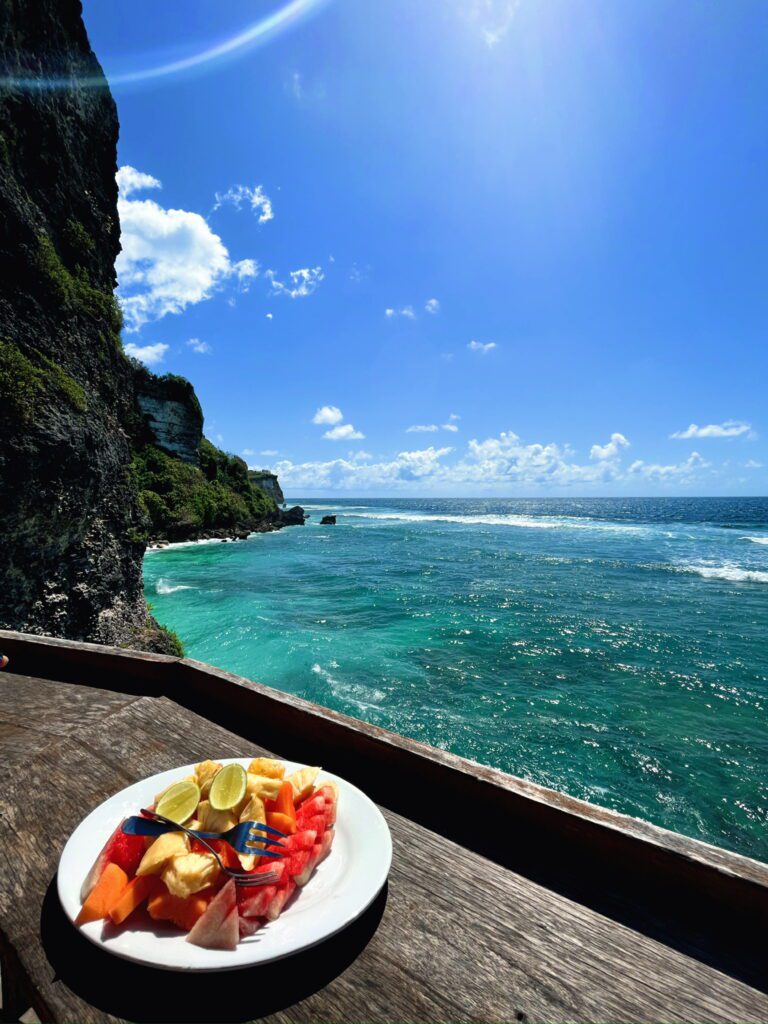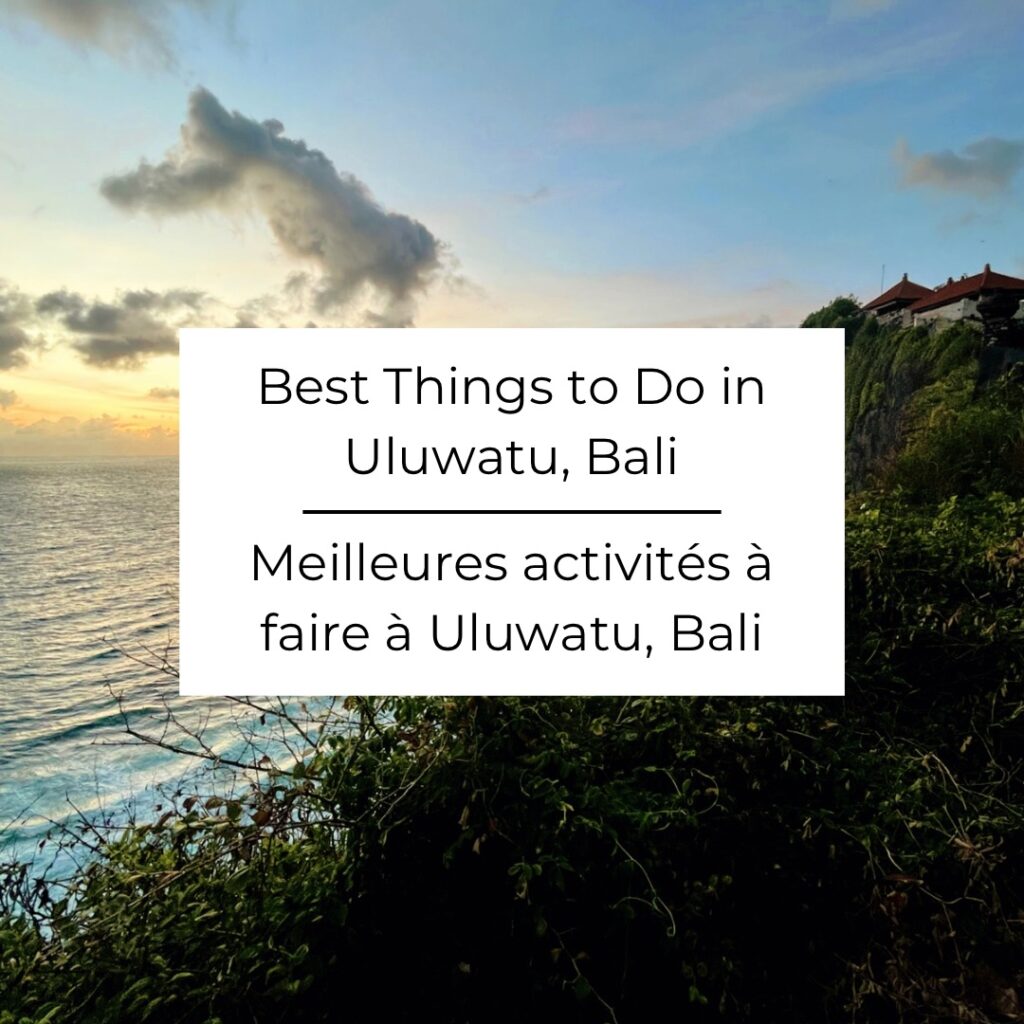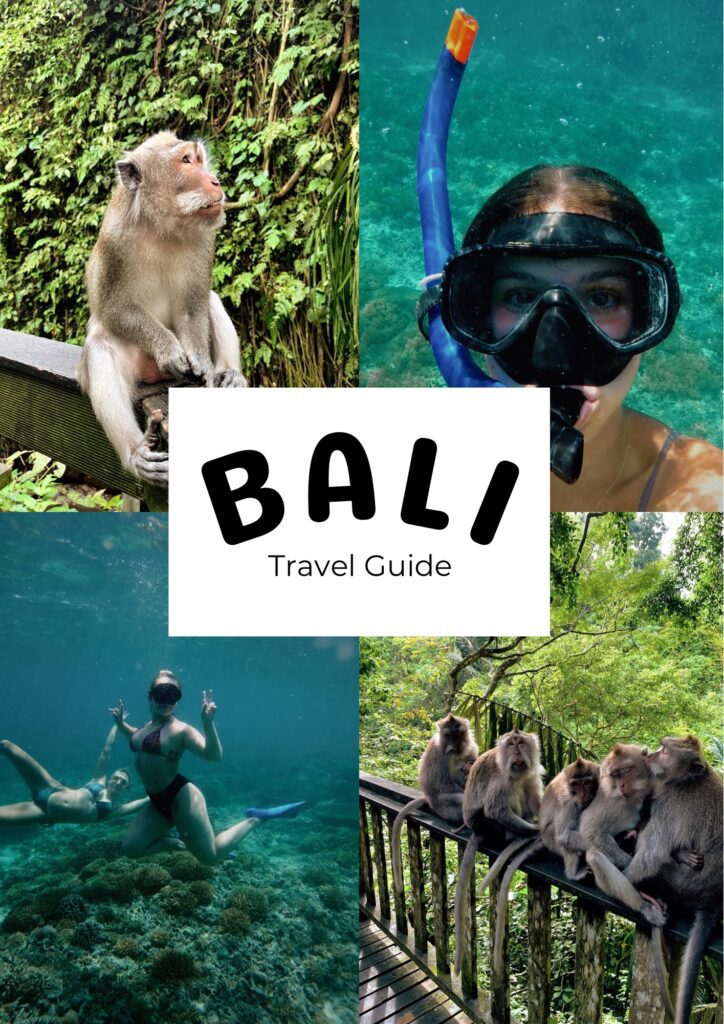Bali isn’t just a tropical paradise, it’s a place that truly captures the heart. From sun-soaked beaches and majestic volcanoes to peaceful rice terraces and vibrant jungles, Bali’s landscapes are nothing short of breathtaking. But what truly sets Bali apart is its vibrant culture and warm hospitality. The island is alive with ancient temples, colorful ceremonies, and a deep sense of tradition. Whether you’re after adventure, relaxation, or a deeper connection with nature and culture, Bali offers an unforgettable experience for every traveler. Ready to explore? Keep reading to plan your perfect Bali trip:
- Best Time to Visit: Climate, Crowds & Prices
- Local Culture & Etiquette: Cultural Norms, Language, Etiquette – Visiting Temples
- Money Currency & Payments
- Accommodation Options: Types of Accommodations, Recommendations, Essential Apps
- Food & Dining: Local Cuisine, Restaurant Suggestions
- Transportation: Renting a Scooter, Traveling Between Cities with Luggage, Essential Apps
- Safety & Health: Tap Water Conditions, Health Precautions, Emergency Informations, Safety Tips
- Visa Requirements
- Staying Connected: Getting a SIM Card in Bali
- Top Attractions & Activities
1
Best Time to Visit
The best time to visit Bali depends on what you want for your trip :
Climate
Bali’s tropical climate ensures warm temperatures throughout the year, but the dry season from April to October is generally considered the best time to visit. We visited Bali in January and another time in March and it was still perfectly fine. It was more cloudy in Ubud since it’s the jungle and it is more humid. But it would never rain for the whole day.
Crowds and Prices
The months that see the highest influx of tourists are July and August. If you’re looking to avoid the peak tourist crowds and higher prices, consider visiting Bali during the shoulder months of May, June or September. You will get better deals on accommodations and overall prices. You can also go during the rainy season like we did and have an amazing experience.
2
Local Culture & Etiquette
Bali’s rich cultural heritage and unique customs play a significant role in everyday life on the island. Understanding and respecting these traditions not only enhances your travel experience but also fosters positive interactions with the local community. Below are three key aspects to keep in mind: cultural norms, language, and etiquette.
Cultural Norms
Bali is deeply rooted in Hinduism, and religion influences many aspects of daily life. You’ll notice offerings (called canang sari) made from flowers, rice, and incense placed on the ground or altars outside homes, shops, and temples. I had the chance of being shown how to make them. The picture I took is one I made myself. Balinese people will love sharing that part of their culture with you, be nice and ask. These are meant to honor the gods and spirits, so it’s important to be mindful not to step on them.
Language
While Bahasa Indonesia is the official language, Balinese (Bahasa Bali) is widely spoken on the island. English is also commonly spoken in tourist areas, but learning a few basic phrases in Balinese or Indonesian can go a long way in showing respect and building rapport with locals. Simple greetings like “Selamat pagi” (Good morning) or “Terima kasih” (Thank you) are always appreciated. Even if your pronunciation isn’t perfect, locals will often smile at your effort and be more open to assisting you.
Etiquette – Visiting Temples
When visiting temples or participating in local ceremonies, modest dress is essential. It’s customary to wear a sarong and sash, which can often be rented or purchased at temple entrances. You need to cover your shoulders and upper arms as well as from your waist down to your knees. Avoid pointing your feet at people or religious objects, as this is considered impolite. When sitting, tuck your feet under you rather than stretching them out in front. Additionally, remember that the head is considered sacred in Balinese culture, so avoid touching anyone on the head, even children. If you’re invited to a local’s home, it’s polite to bring a small gift, such as fruit or sweets, and to remove your shoes before entering.
By understanding and respecting Bali’s cultural norms, language, and etiquette, you can ensure a respectful and enriching experience on this beautiful island.
3
Money Currency & Payments
When traveling to Bali, understanding the local currency and payment methods is essential for a smooth and hassle-free experience. Here’s everything you need to know about managing money during your stay on the island.
Indonesian Rupiah (IDR): The Local Currency
The official currency in Bali is the Indonesian Rupiah (IDR). Banknotes are available in denominations ranging from IDR 1,000 to IDR 100,000, while coins are available in smaller denominations, though they are not as commonly used.
Exchange Rates
Exchange rates can fluctuate, so it’s a good idea to check the current rate before you travel. As a general reference, 10,000 IDR is approximately equivalent to $1 CAD or $0.70 USD, though rates vary.
Currency Exchange
When exchanging currency, always use official exchange counters or banks. What I highly suggest you do, is either exchange the money before your trip at your local bank, or, get money out of an ATM that has your card logo on it, and refuse the currency rate. That means your local bank will take care of modifying the currency and high chances are you will get a better rate.
ATM Withdrawal Limits
Be aware that there are withdrawal limits per transaction, often around IDR 1,500,000 to 3,000,000 (approximately $150-300 CAD). You may be able to make multiple withdrawals if you need more cash, but each withdrawal may incur a fee.
ATM Fees
Your home bank may charge a fee for international withdrawals, and the local bank operating the ATM may also charge a fee. It’s a good idea to withdraw large amounts at once to minimize fees. You can also ask your bank before your trip how they work on that matter. For me, I only had to pay the local bank fee since my bank never charged me and I had no limits.
Security
Use ATMs located inside banks, shopping centers, or other secure locations. Be cautious of any unusual devices attached to the ATM, and cover your PIN when entering it.
Card Payments, Minimum Spend & Transaction Fees
Visa and Mastercard are the most widely accepted cards. American Express and other cards may not be as commonly accepted, especially in smaller establishments. Some places may have a minimum spend requirement for card payments, so it’s useful to ask before making a purchase. Again, check with your bank regarding any foreign transaction fees that may apply when using your card abroad. These can add up, so it’s important to be aware.
Tipping Etiquette
Tipping is not mandatory in Bali, but it is appreciated, especially in the service industry:
- Restaurants and Cafés: Many restaurants include a service charge in the bill, typically around 5-10%. If no service charge is included, a tip of around 10% is appreciated.
- Hotels: It’s common to tip hotel staff, such as bellboys or housekeeping, with IDR 20,000-50,000 (around $1-3 CAD) depending on the service provided.
- Other Services: For services like taxi rides, spa treatments, or guided tours, rounding up the bill or adding a small tip (IDR 10,000-20,000) is a kind gesture.
Stay connected! Follow us on social media for exclusive content & updates on our travels.
On our website, you’ll find all the essential information and tips, while on our social media, you’ll get even more – including personal experiences, funny moments, stunning videos, and much more!
4
Accommodation Options
Choosing your accommodation can significantly impact your travel experience. To help you make the best decision, here’s a breakdown of the three main types of accommodations, with recommendations from our past trips and essential apps that will make booking these stays easier for you!
Types of Accommodations
- Villas: Renting a villa is by far the most visually stunning option, offering unique and original stays that can be truly memorable. Villas are usually equipped like apartments, complete with a kitchen and fridge, allowing you to prepare your own meals. While villas tend to be pricier, you can save money by cooking rather than dining out every day. This option is especially ideal for families or large groups, as splitting the cost can make it more affordable and enjoyable than staying in separate hotel rooms.
- Hotels: Hotels are a classic choice with a wide range of options to suit different budgets. Staying in a hotel offers you the comfort of daily housekeeping, room service, and access to various amenities that you won’t find in a villa, such as spas, yoga classes, and more. If you value security and convenience, hotels are a great option, especially for those who prefer having staff available around the clock to assist with any needs.
- Hostels: For backpackers and budget travelers, hostels are the most economical choice. While they may lack the luxury and comfort of villas or hotels, hostels offer a unique and social experience, perfect for young travelers. You’ll typically have a bed in a shared dormitory, making it an excellent way to meet new people, especially if you’re traveling solo. Many hostels also organize group activities to help guests connect. If you’re young and willing to trade a bit of comfort for a memorable and social experience, hostels are the way to go.
Recommendations
Here are two of my favorite hostels I stayed at during my trip to Bali:
- Beach Hut Hostel, Kuta: With a 9.1 rating on Hostelworld, this large hostel was an excellent choice. I loved the friendly atmosphere, especially the common area with a pool table. The dorm rooms were comfortable, with each bed having its own curtain for privacy. The free breakfast was also a highlight of my stay. Bonus: It’s only a 15-minute walk from the airport.
- Vanara Sugriwa Backpacker Dorm, Ubud: This was the most affordable hostel I stayed at during my time in Bali, and it also included free breakfast. The hostel is located right in the center of Ubud, making it super convenient. The staff were incredibly friendly and welcoming. However, it’s a very quiet hostel (which I loved), but if you’re looking to meet new people or go out, this might not be the best option for you.
Essential Apps
- Booking.com: This app offers a wide range of accommodations, including hotels, hostels, and villas, all in one place.
- Airbnb: Perfect for finding unique and original villas or apartments that offer a home-like experience.
- Hostelworld: Specializing in hostels, this app features an excellent rating system to help you choose the best option. It also includes group chats where you can connect with others who will be staying at the same hostel.
Extra Recommendation: Once you’ve found a place you like, especially with hotels and hostels, be sure to visit their official website. Often, you can find exclusive discounts when booking directly through them.
5
Food & Dining
Bali is truly a culinary paradise! From traditional Balinese dishes to international cuisine, there’s something for every palate and budget. In this section, we’ll explore the local cuisine and provide a few restaurant recommendations.
Local Cuisine
Bali’s local cuisine offers a delightful blend of sweet, savory, and spicy flavors. Traditional Balinese dishes are often centered around rice, accompanied by an array of side dishes that include vegetables, meat, fish, and a variety of aromatic spices and herbs.
Here are three signature dishes that visitors must try:
- Nasi Goreng – Fried Rice
- Babi Guling – Spit roast Pig
- Sate Lilit – Minced Meat Satay
As a pescatarian, I’ve only tried the Nasi Goreng among these three dishes. It’s available everywhere and is often the most affordable item on the menu, typically costing between 10,000 and 30,000 IDR (approximately $1-3 CAD).
Note: If you choose to try these dishes with meat, such as chicken, it’s advisable to eat at reputable restaurants. A friend of mine became extremely ill after eating chicken fried rice at a beach stall. The handling and storage of meat in some places may not meet the same standards we’re accustomed to, and our digestive systems might not handle it as well as the locals’.
Restaurant Suggestions
When we visited Bali, we weren’t particularly focused on documenting our food experiences. However, we did enjoy incredible meals throughout our trip. After reviewing our photos and memories, here are a few restaurants that stood out:
- Beach Bowl Bali: With two locations in Bali—one in Kuta and another in Seminyak—Beach Bowl Bali is renowned for its smoothie bowls, which are as visually appealing as they are delicious. However, what truly impressed me was the quality of their vegan meat in various dishes. As a pescatarian of nearly nine years, I can confidently say that Beach Bowl Bali offers the best vegan meat I’ve ever tasted.
- La Baracca Bali: La Baracca has four locations in Bali: Seminyak, Canggu, Uluwatu, and Ubud. I visited the Uluwatu location in 2022, and I still dream of their fresh tuna panini. Everything on their menu is mouth-watering, but this panini was truly life-changing.
- FINNS Beach Club: Although FINNS is primarily a beach club, I spent an entire day there, and the food was incredible. I enjoyed a pizza with fresh burrata, a delicious panini, and amazing sushi. You should consider spending time at this beach club for many reasons, and their food is certainly one of them!
6
Transportation
Getting around Bali can be an adventure in itself, and understanding the best transportation options will help you make the most of your trip. Here’s a breakdown of the most convenient and cost-effective ways to travel around the island.
Renting a Scooter: The Best Way to Explore Bali
Renting a scooter is by far the most popular and efficient way to explore Bali. Scooters are significantly cheaper than cars, can weave through traffic effortlessly, and save you a lot of time. While you can hop on a scooter as a passenger with a driver, renting one yourself is often the best option, especially if you’re planning a full day of adventure. This gives you the freedom to go wherever you want, whenever you want, without having to wait for a driver.
- Cost and Availability: Scooter rentals are affordable, typically ranging from IDR 75,000 to 100,000 per day (approximately $7-10 CAD). Prices can vary depending on the location, but always negotiate to get the best deal. It’s common to secure a rental for around IDR 100,000 per day. Rental shops are abundant, especially in tourist hubs like Kuta, Seminyak, and Ubud.
- Safety Considerations: Always wear a helmet, even though it might not be enforced everywhere. Bali’s traffic can be chaotic, particularly in busier areas, so it’s essential to be cautious. If you’re not experienced with riding scooters, consider practicing in a quieter area before venturing into busier streets.
- Tips for Choosing Your Scooter: If you’re small in stature, ask for a Scoopy model, which is more compact and easier to handle. You don’t need a large scooter—something small and manageable will do just fine. Also, make sure the scooter has storage space under the seat for your belongings.
- International Driver’s License: While enforcement is inconsistent, it’s advisable to have an international driver’s license. Though I didn’t encounter issues during my month in Bali and didn’t see anyone getting stopped, it’s better to be prepared just in case.
Traveling Between Cities with Luggage
When it comes to moving between cities or towns in Bali with your luggage, there are two great options:
- Grab and Gojek Cars: Ride-sharing services like Grab and Gojek are convenient and affordable for intercity travel. These services are widely available and generally much cheaper than traditional taxis. You can easily book a ride through their respective apps, with costs depending on the distance but remaining relatively low.
- Shuttle Services: If you’re traveling alone or with minimal luggage, shuttle services can be an even cheaper alternative. Many companies operate shuttles between popular tourist destinations, and these can be booked through local travel agencies, online, or at your accommodation. Keep in mind that shuttles may take longer due to multiple stops, but they are an economical choice.
Essential Apps
Without a doubt, Gojek and Grab will be your best friends in Bali! While renting a scooter is ideal for longer adventures and exploring more remote areas, these apps are perfect for shorter trips within cities. If you’re planning to walk around or only need to travel to a nearby beach or restaurant, calling a ride through these apps can be more economical.
To give you an idea of how affordable it is: rides within a city often cost between IDR 10,000-20,000 (about $1-2 CAD). That’s quite impressive and makes these apps a fantastic option for budget-conscious travelers.
7
Safety & Health
When traveling to Bali, it’s important to be aware of both safety and health precautions to ensure a smooth and enjoyable trip. Below are three things to consider: the tap water conditions, other health precautions and emergency information.
Tap Water Conditions
When visiting Bali, it’s crucial to be mindful of the water you consume. Tap water is not safe to drink due to the presence of bacteria and other contaminants that can cause gastrointestinal issues, commonly known as “Bali Belly.”
To stay healthy, always follow these guidelines:
- Opt for bottled water: It’s widely available and affordable. Many hotels and restaurants also provide filtered water for guests.
- Be cautious with ice: It may not always be made from safe water, so be selective about where you consume it.
- Use bottled water for brushing your teeth: This helps avoid accidental ingestion of tap water.
- Rinse fruits and vegetables with bottled or boiled water: This ensures they are free from contaminants.
Health Precautions to Take in Bali
Staying healthy during your time in Bali is crucial for making the most of your trip. Apart from the tap water, here are some important health precautions to keep in mind:
- Food Safety: Like I said in the Local Cuisine section, it’s important to be mindful of where you eat. Stick to well-established restaurants and avoid street food if you’re not sure about the hygiene standards. If you’re eating meat, especially chicken, make sure it’s from a reputable place to avoid any risk of food poisoning.
- Sun Protection: Bali’s tropical climate means strong sun exposure. Always wear sunscreen with high SPF, and consider wearing a hat and sunglasses to protect yourself from sunburn and heatstroke. Stay hydrated by drinking plenty of water throughout the day.
- Insect Protection: Mosquitoes in Bali can carry diseases such as dengue fever. Use insect repellent, especially during the early morning and late afternoon.
- Vaccinations: Before traveling to Bali, ensure that your routine vaccinations are up-to-date. It’s also advisable to consult with your doctor about additional vaccines, such as those for hepatitis A, typhoid, and Japanese encephalitis, depending on your itinerary and length of stay. As a Canadian, some of the vaccines you need take more than one dose with a delay in between. Make sure to inform yourself in advance and know that they can be very pricey if you are not covered by insurance.
Emergency Information
Being prepared for emergencies is an essential part of travel safety. Here’s what you need to know about emergency services in Bali:
Emergency Numbers
- Police: 110
- Ambulance: 118
- Fire Department: 113
- Search and Rescue (SAR): 115
- Tourist Police: +62 361 224111 (for issues specifically involving tourists)
Hospitals and Clinics: Bali has several international-standard hospitals and clinics, particularly in areas like Denpasar, Kuta, and Ubud. Some of the well-known hospitals include BIMC Hospital in Kuta and Siloam Hospital in Denpasar. These facilities offer 24-hour emergency services and are equipped to handle a wide range of medical issues.
Pharmacies: Pharmacies (locally known as “Apotek”) are widely available across the island. They stock most over-the-counter medications and basic medical supplies. If you require prescription medication, it’s advisable to bring enough for your entire trip, as not all medications may be readily available in Bali.
Language and Communication: While many medical professionals in Bali speak English, it’s helpful to have your medical details translated into Indonesian, particularly if you have specific health conditions or are taking prescription medications.
Safety Tips
Every traveler needs to be cautious, especially if you are solo traveling. We wrote an entire article giving you our best safety tips. Make sure to come back at the end of your reading to read our article 12 Essential Safety Tips for Solo Travelers.
8
Visa Requirements
When planning your trip to Bali, understanding the Visa on Arrival (VoA) and the e-Visa on Arrival (e-VoA) options is crucial for ensuring a smooth entry into Indonesia. Here’s what you need to know about these two visa types:
Visa on Arrival (VoA)
- Eligibility: The Visa on Arrival is available to citizens of many countries, including the United States, Canada, the United Kingdom, Australia, and most European nations. It is designed for tourists, business visitors, and those visiting for social purposes.
- Duration: The VoA allows for an initial stay of up to 30 days in Indonesia, including Bali.
- Cost: The fee for the VoA is approximately $50 CAD, payable at the point of entry, typically at the airport or seaport.
- How to Obtain: The VoA can be obtained upon arrival in Bali at the immigration counter. You will need to present your passport (which must be valid for at least six months from your date of entry), a completed immigration card, and the VoA fee. Payment can typically be made in cash (USD, IDR, or other major currencies) or by credit card.
- Extension: The VoA can be extended once for an additional 30 days, allowing for a total stay of up to 60 days. The extension must be applied for at an immigration office in Bali before your initial 30-day period expires. It’s recommended to start the extension process at least a week before your visa’s expiration date.
e-Visa on Arrival (e-VoA)
The e-Visa on Arrival (e-VoA) is an online version of the traditional VoA, designed to streamline the entry process and reduce wait times at the airport.
- How to Apply: You can apply for the e-VoA online before your trip through the official Indonesian immigration website or authorized third-party services. The process involves filling out an online application form, uploading necessary documents (such as a passport scan and a passport-sized photo), and paying the visa fee online.
- Processing Time: The e-VoA is typically processed within a few days, and you’ll receive an electronic visa that you can print out or save on your mobile device to present upon arrival.
- Entry Process: With an e-VoA, you can proceed directly to the dedicated immigration counter for e-VoA holders upon arrival in Bali, where your visa will be verified quickly, allowing for a faster entry process compared to the traditional VoA.
- Duration and Extension: The e-VoA also allows for an initial stay of up to 30 days, with the same extension options as the traditional VoA. You can extend your e-VoA at an immigration office in Bali for an additional 30 days if needed.
My Take on Both Options
Applying for the e-VoA can save time and make your entry into Bali smoother and more efficient. In my memories, in 2022, there was a price difference which made me advise that it was unnecessary to get the e-VoA before your arrival. As of 2024, there is apparently no price difference. If the process of application online is stressing you, or for any other reason, know that the lines upon arrival for the VoA weren’t that bad.
9
Staying Connected: Getting a SIM Card in Bali
One of the most affordable and convenient ways to stay connected during your time in Bali is by purchasing a local SIM card rather than relying on a phone package from your home country. Bali SIM cards are widely available, inexpensive, and provide excellent coverage across the island.
Where to Buy a SIM Card
While you can buy a SIM card directly at the airport upon arrival, it’s worth noting that prices tend to be significantly higher there. A better option is to purchase a SIM card outside the airport. You can simply ask your taxi driver to stop at a reliable vendor—they will know the best places to go.
If you prefer to handle it yourself, look for small markets or convenience stores that display signs saying “SIM CARD.” Prices can vary depending on the location and the data package you choose, but you can generally expect to pay between IDR 200,000 and 500,000 for a long period.
Choosing the Right SIM Card
The cost of your SIM card will depend on how much data you need and where you purchase it. Most vendors offer a variety of packages, so consider how much data you’ll need for your stay. If you plan on using your phone mainly for navigation and occasional social media, a smaller package should suffice. For those who plan to work remotely or stream content, a larger data package will be necessary.
Installation and Tips
When you purchase a SIM card, the vendor should install it for you and ensure it’s working properly. Remember to keep your original SIM card from home in a safe place, so you can easily switch back once you leave Bali.
If you’re unsure about which provider to choose, ask the vendor about the best network coverage in the areas you plan to visit. Popular providers like Telkomsel and XL offer good coverage across most of Bali, including more remote locations.
10
Top Attractions & Activities
Whether you’re seeking adventure, relaxation or cultural immersion, Bali offers a diverse array of attractions and activities that showcase the island’s natural beauty and rich heritage. Here are 3 of them:
Now that you know everything about Bali, it’s time to plan your trip! Here are some articles that could be helpful :
Don’t want to miss out on our latest articles? Be sure to subscribe to our website, and you’ll receive a notification every time we publish something new!
Like this post? Pin it for later!













